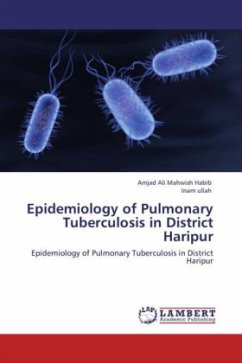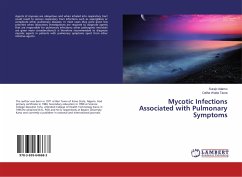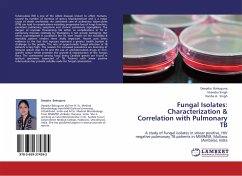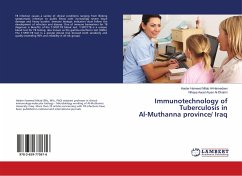
Epidemiology of Pulmonary Tuberculosis in District Haripur
Epidemiology of Pulmonary Tuberculosis in District Haripur
Versandkostenfrei!
Versandfertig in 6-10 Tagen
32,99 €
inkl. MwSt.

PAYBACK Punkte
16 °P sammeln!
Tuberculosis is the most important contagious disease of the world causes morbidity and mortality among adults. Timely and accurate detection is very essential to decline the morbidity and mortality of the disease. In present study a total of 2413 patient s sputum samples were screened for Tuberculosis. Out of 2413 suspected samples, 432 sputum samples were found positive. Prevalence rate was 17.9%. Data analysis revealed that out of these 432 of TB positive patients 190 were males and 242 were females. The distribution breakup of the TB positive patients was 45, 34, 55, 67, 35, 39, 41,32, 49 ...
Tuberculosis is the most important contagious disease of the world causes morbidity and mortality among adults. Timely and accurate detection is very essential to decline the morbidity and mortality of the disease. In present study a total of 2413 patient s sputum samples were screened for Tuberculosis. Out of 2413 suspected samples, 432 sputum samples were found positive. Prevalence rate was 17.9%. Data analysis revealed that out of these 432 of TB positive patients 190 were males and 242 were females. The distribution breakup of the TB positive patients was 45, 34, 55, 67, 35, 39, 41,32, 49 and 35 patients come from the village Jagal, Noor Colony, Malkiyar, Khalabat Township, Shah Maqsood, Ali Khan, Kangrha Colony, Khanpur, Darwesh and Mungh respectively. In present study high prevalence rate was found in age group of 15-30 (23 %). It has been noted that females, 242 (56%) are more affected of Tuberculosis as compared to males, 190 (44%). Our findings indicate that majority of the positive patients have poor socioeconomic conditions. Out of 432 positive patients, 285 (65.98%) belonged to lower class socioeconomic status.












